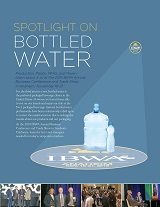Alexandria, VA – The International Bottled Water Association (IBWA) today issued the following statement regarding today’s decision by Massachusetts Attorney General Martha Coakley to support banning bottled water sales in Concord.
“We are disappointed in the decision by the state Attorney General to approve the amendments to the by-laws of the Town of Concord, Massachusetts, that ban the sale of bottled water in single-serve PET bottles within the town, and we are exploring all available options to continue to oppose the by-law.”
“People need to drink more water. The consumption of water, whether from the bottle or the tap, is a good thing and supports people’s pursuit of a healthy lifestyle. Any actions that discourage people from drinking bottled water are not in the public interest. People choose bottled water for several reasons, including its refreshing taste, reliable quality, zero calories and additives, and convenience. Banning or restricting access to bottled water in the marketplace directly impacts the right of people to choose the healthiest beverage on the shelf. And for many, bottled water is a critical alternative to other packaged beverages, which are often less healthy. Bottled water must therefore be available wherever packaged beverages are sold.”
“For those who want to eliminate or moderate calories, sugar, caffeine, artificial flavors or colors, and other ingredients from their diet, choosing bottled water is the right choice. In fact, since 2000, approximately 73% of the growth in bottled water consumption has come from people switching from carbonated soft drinks. That’s the equivalent of avoiding an additional 280 calories per person, per week.”
“The bottled water industry supports a strong public water system. However, the water from public water systems is often compromised after emergency situations or natural disasters (e.g., hurricanes, floods, tornados, fires, or boil alerts). During these times, bottled water is a necessary and reliable “second source” option to deliver clean, safe drinking water.”
“This ban deprives residents of the option to choose their choice of beverage and visitors, who come to this birthplace of American independence, a basic freedom gifted to them by the actions in this town more than 200 years ago. It will also deprive the town of needed tax revenue and harm local businesses that rely on bottled water sales.”
# # #
Media Contact:
Chris Hogan
[email protected]
703.647.4609
The International Bottled Water Association (IBWA) is the authoritative source of information about all types of bottled waters. Founded in 1958, IBWA’s membership includes U.S. and international bottlers, distributors and suppliers. IBWA is committed to working with the U.S. Food and Drug Administration (FDA), which regulates bottled water as a packaged food product, and state governments to set stringent standards for safe, high quality bottled water products.
In addition to FDA and state regulations, the Association requires member bottlers to adhere to the IBWA Bottled Water Code of Practice, which mandates additional standards and practices that in some cases are more stringent than federal and state regulations. A key feature of the IBWA Bottled Water Code of Practice is an annual plant inspection by an independent, third party organization. Consumers can contact IBWA at 1-800-WATER-11 or log onto IBWA’s web site (www.bottledwater.org) for more information about bottled water and a list of members’ brands. Media inquiries can be directed to IBWA Vice President of Communications Chris Hogan at 703-647-4609 or [email protected]



























